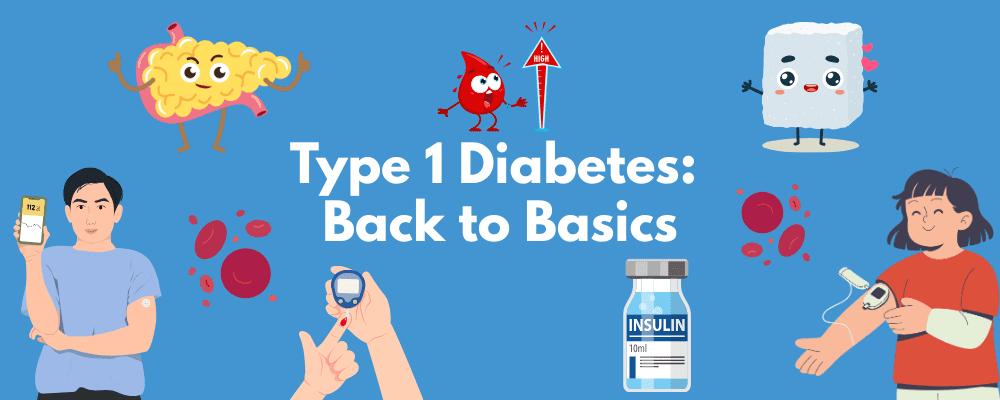Protecting your vision is crucial when living with type 1 diabetes (T1D). People with T1D face a higher risk of developing diabetic eye disease (DED), a serious condition that can lead to vision loss if not properly managed. Regular eye care and early detection are key to maintaining eye health. This month, alongside our other post “Dr. Risa Wolf on Diabetic Eye Disease Research,” we’ll delve into essential eye care tips and the latest research. Stay informed, take action, and safeguard your vision and overall health.
Understanding DED
DED is a group of eye problems that can affect people with T1D. The most common types include diabetic retinopathy, diabetic macular edema, cataracts, and glaucoma. These conditions can lead to severe vision loss and even blindness if not detected and treated early.
DED occurs due to high blood sugar levels damaging the blood vessels in the retina. Symptoms often include blurry vision, floaters, dark spots, and difficulty seeing colors. Regular eye screenings are crucial because DED can develop without noticeable symptoms in its early stages.
Early detection through comprehensive eye exams can prevent severe complications. Endocrinologists and eye care specialists work together to monitor and manage your eye health, reducing the risk of long-term damage. Supporting research on T1D through donations to Diabetes Research Connection (DRC) can help advance innovative treatments, ensuring better outcomes for those with T1D.
Importance of Regular Eye Screenings
Regular eye screenings are vital for individuals with T1D to catch DED early. Early detection is key to preventing serious vision problems. Those with T1D should have annual comprehensive eye exams, starting five years after diagnosis.
Eye screenings can detect subtle changes in the retina before symptoms appear. These include dilated eye exams, retinal photography, and optical coherence tomography (OCT). Detecting issues like diabetic retinopathy early allows for timely treatment, reducing the risk of vision loss.
Endocrinologists and eye care specialists play crucial roles in monitoring and managing your eye health. Keeping your blood sugar levels under control, maintaining a healthy lifestyle, and attending regular eye exams are a strong defense against DED.
Keeping Your Eyes Healthy: Tips and Best Practices
Maintaining eye health is essential for individuals with T1D. Here are some practical tips and best practices:
- Manage Blood Sugar Levels: Keeping your blood sugar levels within the target range helps prevent damage to the blood vessels in your eyes.
- Healthy Lifestyle Choices: Eat a balanced diet rich in fruits, vegetables, and whole grains. Regular exercise helps manage diabetes and promotes overall eye health. Avoid smoking, as it can exacerbate eye conditions.
- Protect Your Eyes: Wear sunglasses that block UV rays to protect your eyes from sunlight. Use safety eyewear when engaging in activities that could harm your eyes.
- Regular Eye Exams: Schedule comprehensive eye exams annually, as recommended by your eye care specialist. Early detection of DED can prevent severe complications.
- Stay Informed About Treatments: Keep up with the latest research on eye health and T1D. New treatments and clinical studies, including those supported by DRC, offer promising advancements.
Taking these steps can significantly reduce your risk of developing serious eye problems. By staying proactive about your eye care, you can ensure better health and quality of life while living with T1D.
Current Research and Breakthroughs in T1D Eye Care
Recent advancements in understanding the genetic origins of T1D are shedding light on its impact on eye health. Studies reveal that specific genetic markers can influence the development of DED, providing new targets for early intervention and treatment.
Novel treatments are being developed, including stem cell therapies and genetically engineered cells, which hold the promise of repairing and regenerating damaged tissues in the eyes of T1D patients. These innovative approaches could significantly improve the quality of life for those living with T1D by preventing or reversing the effects of DED.
In a groundbreaking study funded by the DRC, Dr. Risa Wolf at Johns Hopkins University is leveraging the power of autonomous artificial intelligence (AI) to transform early detection of DED in T1D youth.
Diabetic eye disease, a leading cause of blindness in adults, remains a concern for youth with diabetes. However, many in communities with fewer resources miss crucial screening exams, exacerbating the care gap. Dr. Wolf’s research focuses on using AI to boost screening rates in these communities, offering a promising solution to improve the outcomes for T1D youth at risk of DED.
The DRC-funded study reveals that AI significantly increases diabetic eye exam completion rates, effectively closing the care gap in communities with fewer resources. This breakthrough not only enhances early detection but also improves follow-up care, creating a way for a more accessible and inclusive approach to diabetic eye disease management.
Taking Action for Eye Health
Maintaining good eye health is vital for individuals with T1D. Regular screenings, managing blood sugar levels, and staying informed about the latest research can significantly reduce the risk of DED. Recent advancements offer hope for the management and prevention of eye complications in T1D patients.
Supporting research efforts through DRC is crucial. These contributions help fund groundbreaking studies driving the development of new treatments that improve the quality of life for those living with T1D. By staying proactive about eye care and supporting ongoing research, we can work towards a future where DED no longer threatens the vision of individuals with T1D.
For more insights into advancements in DED detection, read Dr. Risa Wolf’s blog, “Dr. Risa Wolf on Diabetic Eye Disease Research.” Her innovative work highlights the potential of AI technology to transform early detection and management of DED. Together, these resources provide a comprehensive guide to protecting your vision and managing eye health while living with T1D.
Join us in supporting DRC. Your donations can impact advancing research and finding better solutions for managing T1D. Together, we can help protect the vision and health of everyone affected.
Visit the DRC website for the latest updates on T1D research and ways to support groundbreaking studies.




